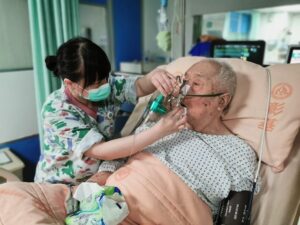Are the Elderly More Vulnerable to Mosquito-Borne Diseases?
Abstract
The vulnerability of the elderly population to mosquito-borne diseases is a topic of increasing concern with the increase in temperatures, especially in regions with high mosquito populations such as Florida.
This paper look at the susceptibility of the elderly to these diseases, the impact of mosquito bites on immuno-depressed individuals, strategies for boosting the immune system in the elderly, and advice for those living in 55+ communities in mosquito-prone areas.
1. Introduction
Mosquito-borne diseases, including dengue, Zika, chikungunya, and West Nile virus, pose significant health risks worldwide. With the aging global population, understanding the susceptibility of the elderly to these diseases becomes crucial. Florida was exposed to several epidemic episodes for these diseases over the past 25 years, and both state, county and city authorities devote significant resources each year to the prevention of outbreaks through aerial and truck-based applications of insecticides. Our government also purse educational program and awareness campaigns that have proven to benefit the elderly population throughout the State of Florida.
2. Effects of Mosquito-Borne Diseases on the Elderly
2.1. Increased Susceptibility
Elderly individuals often have a weakened immune system, making them more susceptible to infections. A study by Paixão et al. (2018) found that the elderly population had a higher risk of dengue-related hospitalization and death.
2.2. Chronic Conditions
The presence of chronic conditions, common in the elderly, will exacerbate the effects of mosquito-borne diseases. A study by Figueiredo et al. (2010) highlighted that individuals with chronic diseases had a higher risk of severe dengue outcomes.
3. Impact of Mosquito Bites on Immuno-Depressed People
3.1. Compromised Immune Response
Immuno-depressed individuals, due to conditions like HIV/AIDS or treatments like chemotherapy, are at a heightened risk. A study by Sharp et al. (2014) found that immuno-depressed individuals had a higher risk of West Nile virus neuroinvasive disease.
3.2. Delayed Recovery
The weakened immune system in immuno-depressed individuals can lead to prolonged illness and complications from mosquito-borne diseases.
4. How Best Can Elderly People Boost Their Immuno-System?
4.1. Balanced Diet
A study by Maggini et al. (2018) emphasized the role of micronutrients, including vitamins C and D, in supporting the immune system4.
4.2. Regular Exercise
Medical doctors and physical therapists recognize that physical activity enhances immune function. Moderate exercise tends to reduce the risk of infection and improve vaccine responses. Moderate exercise is typically encouraged by the activity directors of assisted living facilities and senior communities.
4.3. Stress Management
Chronic stress can weaken the immune system. Mindfulness practices, meditation, and adequate sleep can help manage stress. Senior living communities often have community centers at walking or golf cart distance of any home in the community, where residents can take yoga or Tai Chi classes.
5. Protection against mosquito-born diseases
Elderly people living in 55+ Communities in Florida would do well to follow these simple recommendation, especially if they live in regions where large mosquito populations thrive.
5.1. Mosquito-Proofing Homes
Ensure window and door screens are intact. Use air conditioning when possible.
5.2. Personal Protection
Wear long-sleeved shirts and pants outside. Use EPA-registered insect repellents.
5.3. Community Measures
Engage in community-wide efforts to reduce mosquito breeding sites. This includes eliminating standing water in containers and ensuring proper drainage.
5.4. Stay Informed
Monitor local news for mosquito activity and disease outbreaks. Participate in community awareness programs.
6. Conclusion
The elderly population is indeed more vulnerable to mosquito-borne diseases due to a combination of weakened immunity and the presence of chronic conditions.
This demographic, especially those in mosquito-prone regions, should take preventative measures and stay informed.
References:
Paixão et al. (2018). “Dengue in Elderly Patients: Clinical Characteristics and Predictors of Severe Disease”. Acta Tropica.
Figueiredo et al. (2010). “Dengue and comorbidities in the elderly”. Journal of Clinical Virology.
Sharp et al. (2014). “West Nile virus risk in immunodepressed individuals”. Clinical Infectious Diseases.
Maggini et al. (2018). “Immune Function and Micronutrient Requirements Change over the Life Course”. Nutrients.
CDC (2021). “Prevent Mosquito Bites”. Centers for Disease Control and Prevention.


